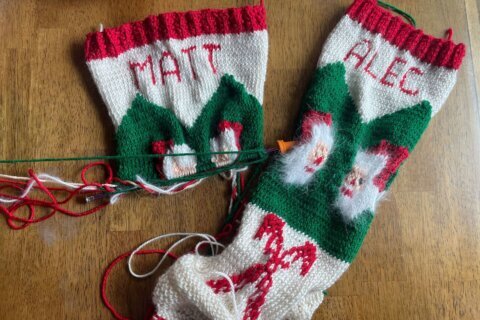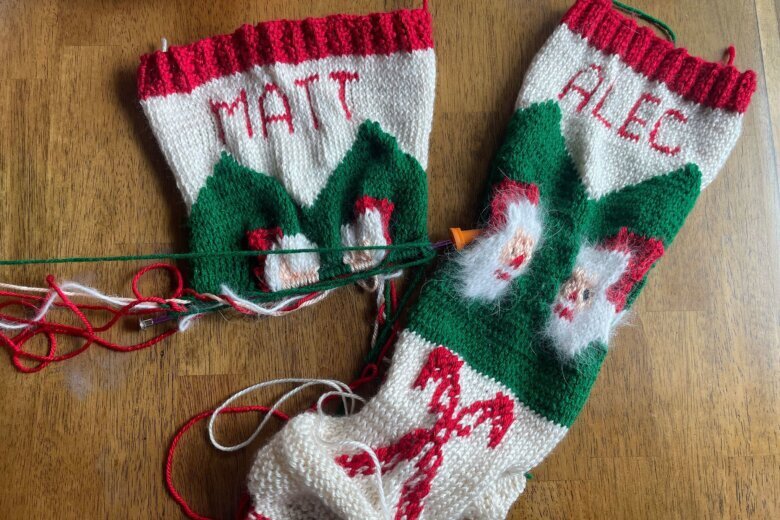
(CNN) — My fingers were cramping, and my brain was pounding, but slowly familiar images started to take shape: a name, a candy cane and Santa Claus’ face.
The Christmas stocking that hung in my house growing up always felt extra special. My grandmother, a Jewish woman from a Russian refugee family who married a Christian man, had knit the same pattern for each of her five children in the 1960s.
Then, when my brothers and I became the only grandchildren to grow up in a Christmas house, she made them for us, too. But our five cousins didn’t regularly celebrate Christmas.
When our grandmother died unexpectedly in 2017, it felt like the end of a tradition of handmade, personalized Christmas stockings and that my cousins’ chances of joining us with stockings on the mantel were gone.
This year, I embarked on a journey to learn to make them. At first, it felt like a nice way to keep a part of Christmas I had always loved as a child, but now I feel closer to my Grandma Mimi than I ever have before.
Grandma Mimi was an amazing woman, but she was hard to feel really close to when I was a child.
She always expressed her love by making things. She smiled softly when the grandkids came clamoring through the door to disturb her shy, quiet peace. And instead of smothering us with kisses like other grandmothers, she always had something ready for us.
Often it was the knitting in her hands, the repaired zipper on a dress you couldn’t give up when it broke, or piroshki (Russian meat pastries) that you really wished were Ghirardelli box brownies because 8-year-olds often don’t appreciate the finer things.
It took me awhile to understand that the things she made meant the same as “I love you” or “I missed you.”
It wasn’t that she was cold — not at all. My mom often explained to me that sometimes people as brilliant as Grandma Mimi have a hard time relating to others.
I began to get a glimpse into the relationship we could have when I was in college, and she started pattering into whatever room I was in during my visit to ask if I studied the Romantic poets or how familiar I was with Aristotle.
I tried my best to keep up, but there was a lot I never knew about my grandmother until she passed.
I knew — and loved — that every room and hallway in her house had a bookcase, and these were brimming with books on every subject in several languages.
She was a chemist by profession, a seamstress on the side, a word-of-mouth repairer of people’s antique wicker furniture, recipe contest winner at the Russian Tea Room, the mother of five children (one with autism and another with childhood brain cancer), a backyard farmer, and the maker of all her children’s knitwear.
When I got older, she was also our personal Google. Could I swap out cornstarch in this recipe? Was this face wash going to cure my acne?
When I asked questions about herself or our family history, she wasn’t always so ready to provide the answers.
Could she tell me about how she made that sweater? Oh, it was nothing. Did she really speak six languages? That’s an exaggeration because her Spanish was rusty. Was there any interesting family history I should know about for my school report? “Not really,” I remember her saying while we sat on the beach.
But there were things that might have been swirling around in her brain that she didn’t tell me then. Things I would find out in the eulogies and teary hugs at her memorial.
A healthy woman recovering from a Pilates injury, Grandma Mimi died in her sleep shortly before she was going to fly out for my cousin’s bar mitzvah. She was 87 years old, but you would never believe it. Her death caught the whole family off guard.
Instead of getting the stories from her, I spent time with aunts, uncles, cousins, family friends and people I had never met huddled together in the funeral home, piecing together the tidbits we each had of who she was and where we came from.
Her father’s family ran an anti-czarist press and fled Russia for the United States in 1905. Her cousins survived Nazi concentration camps by pretending they were twins and opting for experimentation rather than certain death.
The details are hard to confirm. Each family member has pieces of information from the times she let a story slip — and then didn’t speak of it again.
She knew her first baby, Susan, who was born in 1957, had a disability right away. And when the doctors told her she should send her autistic, nonverbal daughter to an institution, she refused. She not only became her daughter’s support system but also advocated for my aunt to get the education and opportunities that weren’t created or designed for her in the 1960s.
I wish there were more tender moments of connection with this magical figure I could hear about now. I wish I could have interrogated her to find out how to unlock my own version of extraordinary from the genes we shared.
Learning to knit has been a second-best option. I’m working off the same pattern my grandmother did when she made my stocking. And now when I visit the Victorian family home in the small New York town where she lived, I go through the nooks and crannies where she stored her supplies and take back things I can use for my stockings.
And although mine will be clumsy and unfinished wrapped under the tree for three of my cousins this year, now I understand the love and thought that goes into the seemingly never-ending rows of knitting.
Next year, the rest of my cousins will get them. And if we get married and build families of our own, I can keep making them, and we will get to tell the story of our extraordinary grandmother and show the love she had for us in our handmade knit stockings.
The-CNN-Wire
™ & © 2023 Cable News Network, Inc., a Warner Bros. Discovery Company. All rights reserved.







